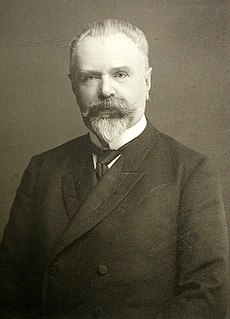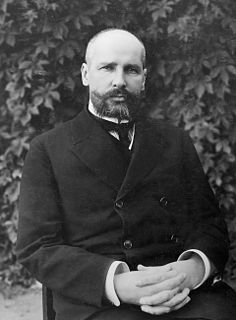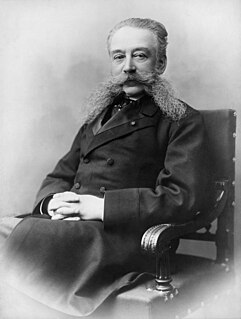In parliamentary and some semi-presidential systems, a dissolution of parliament is the dispersal of a legislature at the call of an election.

Baron Boris Vladimirovich Stürmer was a Russian lawyer, a Master of Ceremonies at the Russian Court, and a district governor of Baltic German descent. He became a member of the Russian Assembly, and as a master of political compromise, he served as Prime Minister, and Minister of Internal Affairs and Foreign Minister of the Russian Empire in the year 1916, but he had little or no experience with Foreign Affairs.

Alexander Fyodorovitch Trepov was the Prime Minister of the Russian Empire from 23 November 1916 until 9 January 1917. He was conservative, a monarchist, a member of the Russian Assembly, an advocate of moderate and sane reforms, and opposed to the influence of Grigori Rasputin.
Ivan Stepanovich Silayev is a former Soviet official who became a Russian politician following the dissolution of the Soviet Union. He served as Premier of the Soviet Union through the offices of chairman of the Interstate Economic Committee and chairman of the Committee on the Operational Management of the Soviet economy from 6 September to 26 December 1991. Responsible for overseeing the economy of the Soviet Union during the late Gorbachev Era, he was the last Premier of the Soviet Union.
The Russian Council of Ministers is an executive governmental council that brings together the principal officers of the Executive Branch of the Russian government. This includes the chairman of the government and ministers of federal government departments.

Yevgeny Primakov's Cabinet was the seventh cabinet of government of the Russian Federation, preceded by Sergei Kiriyenko's Cabinet fallen as a result of the 1998 Russian financial crisis and followed by Sergei Stepashin's Cabinet. It was led by Prime Minister Yevgeny Primakov, proposed by President Boris Yeltsin on September 10, 1998, as Viktor Chernomyrdin had failed to be approved by the State Duma twice by September 7 ; According to the Constitution of Russia, if parliament rejects the president's nomination three times, then parliament must be dissolved and a general election held. On September 11 Primakov was approved by the Duma as Prime Minister and appointed Prime Minister by the President. In the State Duma only Vladimir Zhirinovsky's Liberal Democratic Party of Russia was both in favor of Chernomyrdin and against Primakov.

The State Duma or Imperial Duma was the Lower House, part of the legislative assembly in the late Russian Empire, which held its meetings in the Taurida Palace in St. Petersburg. It convened four times between 27 April 1906 and the collapse of the Empire in February 1917. The First and the Second Dumas were more democratic and represented a greater number of national types than their successors. The Third Duma was dominated by gentry, landowners and businessmen. The Fourth Duma held five sessions; it existed until 2 March 1917, and was formally dissolved on 6 October 1917.

Legislative elections were held in the Russian Empire from 26 March 1906 till 20 April. At stake were the 478 seats in the State Duma of the Russian Empire, the legislative assembly. Election for the First State Duma, which only ran from 27 April to 8 July (O.S.) 1906, returned a significant bloc of moderate socialists and two liberal parties which demanded further reforms. For this reason, it is sometimes called the Duma of Public Anger.

The Vyborg Manifesto was a proclamation signed by several Russian politicians, primarily Kadets and Trudoviks) of the dissolved First Duma July 22nd 1906.

Mammad Yusif Jafarov Hajibaba oglu was an Azerbaijani statesman.

Following the August 1991 Soviet coup d'état attempt, the State Council of the Union of Soviet Socialist Republics (USSR), but also known as the State Soviet, was formed on 5 September 1991 and was designed to be one of the most important government offices in Mikhail Gorbachev's Soviet Union. The members of the council consisted of the President of the Soviet Union, and highest officials from the Soviet Union Republics. During the period of transition it was the highest organ of state power, having the power to elect a premier, or a person who would take Gorbachev's place if absent; the office of Vice President of the Soviet Union had been abolished following the failed August Coup that very same year.
Events from the year 1916 in Russia

Cabinet of Pyotr Stolypin – composition of the Council of Ministers of the Russian Empire, under the leadership of Pyotr Stolypin, worked from July 21, 1906 to September 18, 1911.
Events from the year 1906 in Russia
Ivan Vasilievich Krivonogov was a medical doctor, deputy of the Arkhangelsk City Duma and deputy of the Fourth Imperial Duma from the Arkhangelsk Governorate between 1913 and 1917. After February Revolution of 1917, he became a commissar of the Russian Provisional Government.

The Council of Ministers of the Russian Empire was the highest executive authority of the Russian Empire, created in a new form by the highest decree of October 19, 1905 for the general "management and unification of the actions of the chief heads of departments on subjects of both legislation and higher state administration". The ministers ceased to be separate officials, responsible to the emperor, each only for their actions and orders.















